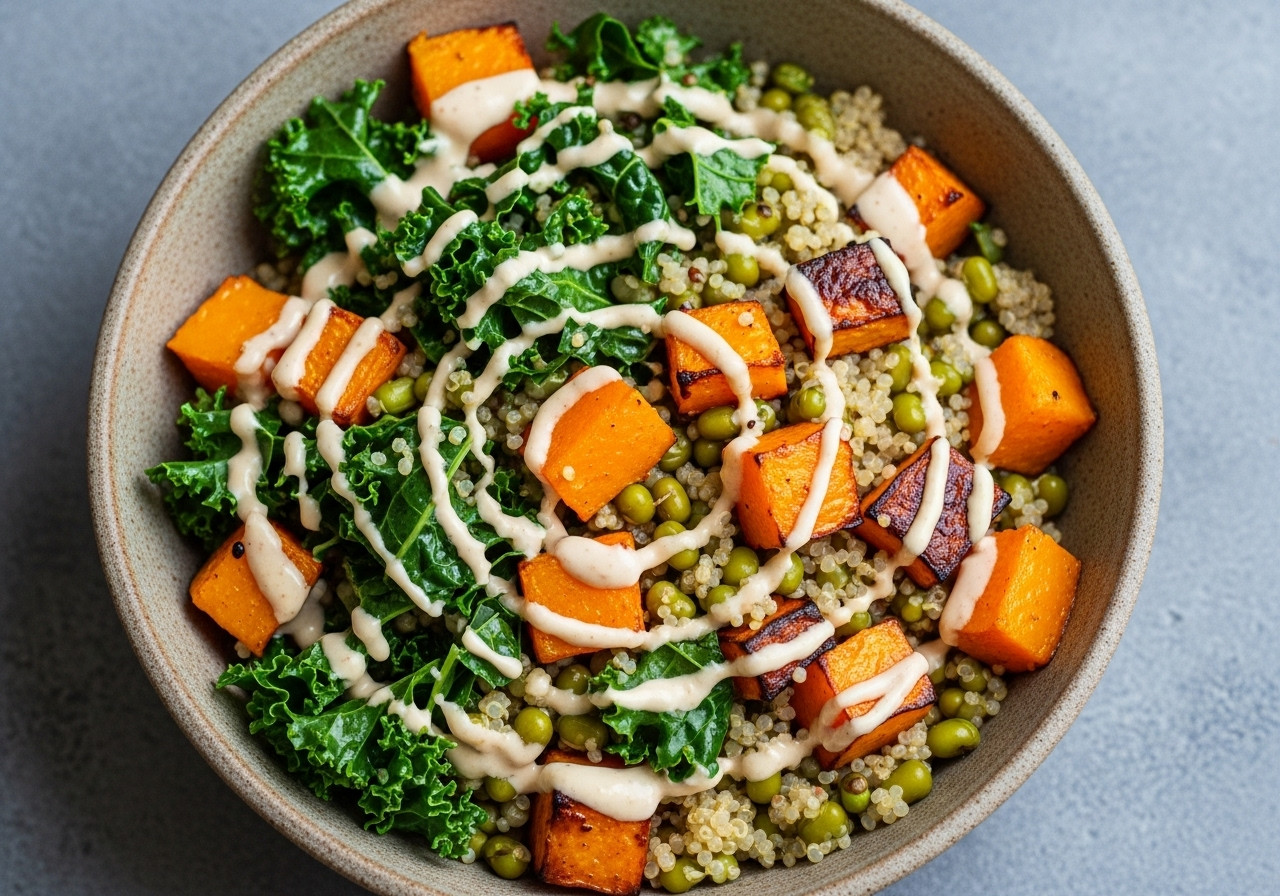Your gut is more than a digestion machine — it's a second brain that makes neurotransmitters like dopamine and serotonin. Feed it right and it will reward you with better mood, sharper focus and natural weight management.
 How fibre fuels your microbiome
How fibre fuels your microbiome
Got brain fog? Feeling meh? Your gut microbes might be hungry.
For decades, nutrition advice focused on calories and macros. Now we know there's a second brain in your belly - the gut-brain axis - and it's wired straight to your mood and appetite. Your intestines house an enteric nervous system with between 200-600 million neurons.
This “second brain” chats to your real brain using nerves, hormones and immune signals[1]. Even more amazing? Your gut microbes make many of the same chemicals as your brain — like serotonin, dopamine, norepinephrine and GABA. In fact, microbes produce around 95 % of your body's serotonin.
A well-fed microbiome sends feel-good messages up your vagus nerve and helps you feel full. But starve it of fibre and those friendly bugs die off. Overdo ultra-processed food and harmful species take over. Result? Cravings, weight gain and low mood.
The good news? You can nourish your second brain with real, delicious food. Here's how.
Feed Your Microbiome: Fibre & Prebiotics
Why Fibre Matters
Fibre isn't just filler - it's food for your friendly gut bugs. When you eat fibre, your microbes turn it into feel-good compounds called SCFAs that help calm inflammation, tell your brain you're full[2], and even help regulate your mood.
Certain fibres - like inulin, resistant starch and beta-glucans - are especially good at feeding the right kinds of microbes. That's why high-fibre diets don't just keep you regular — they help with appetite, energy and even mental wellbeing[3].
In fact, studies show that people who regularly eat prebiotics feel fuller, snack less, and may even avoid weight gain over time. Plus, some fibres may lower stress and boost positivity. Not bad for something you can get from oats, onions and bananas.
Fibre-Rich Foods for Happy Microbes
| Food | Key fibre or prebiotic | Other perks |
|---|---|---|
| Whole grains (oats, barley, quinoa) | Beta-glucans & resistant starch | Sustained energy; supports SCFA production |
| Pulses (lentils, chickpeas, beans) | Soluble & insoluble fibre | Plant-based protein & iron |
| Nuts & seeds (flax, chia, almonds) | Prebiotic fibre & omega-3 | Healthy fats for brain & joints |
| Fruit & veg (bananas, onions, garlic, artichokes, apples) | Inulin, pectin & polyphenols | Natural sweetness & antioxidants |
| Root veg (sweet potato, beetroot) | Resistant starch (when cooled) | Complex carbs & gut-loving starch |
Pro tip: Build meals around at least one of these categories. A chickpea curry with spinach, a bowl of oats topped with berries and seeds, or roasted root veg with whole-grain couscous can keep your microbiota and taste buds happy. Wist makes it easy to log these foods by snapping a photo or sending a quick message - it even celebrates your fibre achievements with a dopamine-boosting cheer.
Fermented Foods: Live Cultures for a Better Mood
While fibre feeds your microbes, fermented foods bring in the reinforcements. These are rich in live cultures (probiotics) that help keep your gut diverse, strong and communicative with your brain.
Foods like yoghurt, kefir, kimchi, sauerkraut and miso don't just aid digestion — they may also reduce inflammation, support the gut barrier, and influence mood-regulating hormones like serotonin and GLP-1[4].

Even if the science is still evolving, it's a delicious gamble: adding a spoonful of sauerkraut or a glass of kombucha to your day could lift your mood, ease your gut and sharpen your mind[5].
Omega-3s & Polyphenols: Brain Fuel from Sea & Plants
Your brain is mostly fat - so it's no surprise that certain fats help it thrive. Omega-3s (from oily fish, walnuts and chia seeds) support brain structure, reduce inflammation and may help preserve memory[6].

Meanwhile, plant compounds called polyphenols (like those in dark chocolate and green tea) boost blood flow to the brain and may enhance learning and mood. The effects can be seen in hours - and sustained over weeks.
Wist automatically tracks omega-3 intake from foods you log - so every salmon fillet, flaxseed sprinkle or spoon of matcha gets the credit it deserves.
Gut Health, Dopamine & Weight Management
Your gut bugs aren't just freeloaders — they actively help manage appetite and metabolism. When you feed them fibre, they produce SCFAs like propionate and butyrate, which tell your brain you're full and energised.
These signals influence hormones (like GLP-1 and ghrelin) that curb cravings and boost fat burning. Studies even show that transplanting gut bacteria from lean people to mice can keep those mice lean.
Fermented foods support this process by enhancing the gut lining and reducing inflammation — helping you feel balanced, satisfied and more in control of what (and how much) you eat.
Practical & Delicious Ways to Feed Your Microbiome
The best part? Feeding your gut doesn't mean eating bland “health food.” Try this sample day for inspiration:
- Breakfast: Overnight oats with kefir, chia seeds and berries — topped with dark chocolate chips.
- Snack: Apple slices with almond butter and a spoonful of live yoghurt.
- Lunch: Quinoa salad with roasted sweet potato, spinach, seeds and kimchi. Olive oil drizzle optional (but encouraged).
- Afternoon sip: Swap soda for kombucha or green tea.
- Dinner: Grilled salmon with fermented slaw and steamed broccoli. Treat yourself to a square of dark chocolate.
Focus on variety, not perfection. Small gut-loving choices — spread throughout the day — are more powerful than one giant salad.
Myths & Mistakes: What to Avoid
- Just popping probiotic pills. Fermented foods offer a broader range of microbes and real nutrients[7].
- Going low-fibre. Carb-restricted diets can starve your gut bugs. A balanced plate is best.
- Dirty bulking for your gut. Processed foods and sugar weaken the microbiome. Herbs, spices and plants are your allies.
- Expecting miracles overnight. Consistency beats intensity. Small changes, repeated daily, build a thriving gut.
Wist: Your Gut-Brain Cheerleader
Logging food shouldn't feel like homework. Wist makes it easy — just snap a photo or type a few words. Our AI figures out what's on your plate and gives you instant feedback on fibre, omega-3s, fruit & veg and more.
You'll earn points, streaks and dopamine-boosting cheers every time you hit a daily goal. We're not here to judge — we're here to help you build momentum and feel good along the way.
References
- More Than a Gut Feeling: How Your Microbiome Affects Your Mood - longevity.stanford.edu
- The role of short chain fatty acids in appetite regulation and energy homeostasis - pmc.ncbi.nlm.nih.gov
- Prebiotic intake reduces the waking cortisol response and alters emotional bias - link.springer.com
- Could eating more fermented foods help improve mental health? - www.medicalnewstoday.com
- Association Between Consumption of Fermented Food and Food-Derived Prebiotics With Cognitive Performance - frontiersin.org
- Study links omega-3s to improved brain structure, cognition at midlife - news.uthscsa.edu
- How Probiotics Support Healthy Weight Loss - health.clevelandclinic.org

